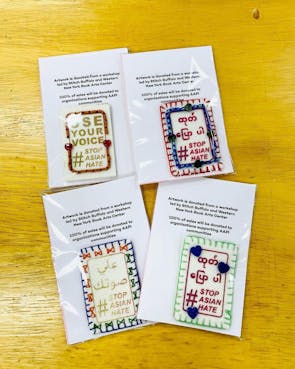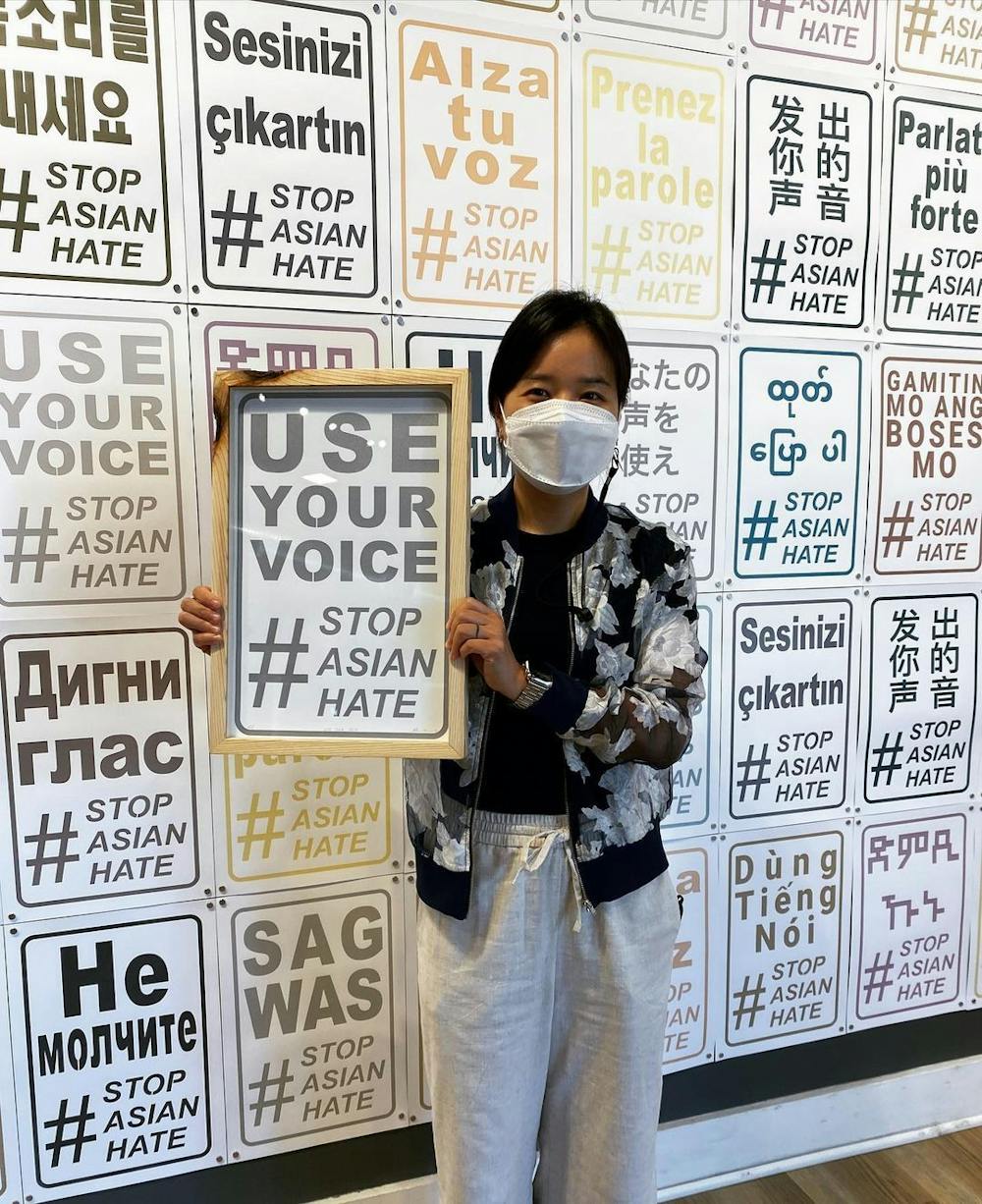When Mizin Shin was an MFA student at UB in the mid-2010s, her printmaking focused less on social justice issues, and more on traditional art.
But in the wake of the Stop Asian Hate rallies that swept across the U.S. last year, Shin decided to switch her focus to the “Spoken and Seen #UseYourVoice” spontaneous art campaign she launched in March.

“Truth is it’s always been like that,” Shin told The Spectrum in an interview, in reference to Asian hate. “It’s just been more violent [recently], and more revealed in public. I don’t think my work [at UB] was a lot about social justice. To be honest, this is the first time I’m making my voice heard strongly through my artwork. As an Asian, I want somebody to see this message and feel the same way.”
According to recently updated FBI data, Asian hate crimes rose 73% in 2020, disproportionately higher than the 13% across-the-board increase in hate crimes nationally. Shin started her campaign with a simple Instagram post captioned “#stopasianhate” on April 1. It featured Shin holding her handmade print. Soon after, one of her friends contacted her to purchase one.
“So I immediately changed the path of my prints,” Shin said of her first sale. “Instead of just posting, I thought about selling this work and then raising money to support other organizations supporting AAPI communities.”
Shin was actually never planning on becoming a printmaker — or any form of artist. The way she tells it, it was an accident waiting to happen.
Born and raised in Ulsan, South Korea, Shin remembers her mother teaching her how to draw and paint by the age of 7. As the years went on, her passion for art grew and she wanted to continue her work professionally as a full-time artist.
But this desire came with parental reservations.
“My mom is a painter and then it’s funny that she didn’t want me to go to art school which was very interesting. She wanted me to go become a teacher because teachers in Korean public schools are highly respected and well-paid,” Shin said.
Her journey started after she saw a large black printing press on a high school tour of what would become her alma mater, Hongik University in Seoul.
“I applied for printmaking after I saw the giant press, because for me at that time I felt like I had been doing paintings for a while,” Shin said. “I really loved printmaking, it really suits my personality, my work ethic — it’s very process-based and I love watching how things are made.”
After finishing her undergraduate studies in Seoul, Shin moved to Buffalo in 2015 to receive her master of fine arts.
At UB, she says, “Faculty didn’t treat me as an international student and they didn’t eliminate me as one of the candidates who could get more opportunities.”
Shin earned a TA scholarship and valuable life mentorship from Jeff Sherven, a UB art department instructor in the Print Media division.
“When I was in a program, there was a huge printmaking conference, and they changed the location each year,” Shin said. I wanted to go but, as an international student, I can’t work and then I don’t have money, so he [Sherven] really supported a kind of program where students can participate in that kind of conference.”
Without crucial financial support from Sherven and others like Adele Henderson, UB’s program head of Print Media, Shin says she couldn’t have gotten a graduate fellowship in her second year in the program. Immediately after graduation, Shin taught as an adjunct professor at UB for a few semesters, before moving to Rochester in 2019.
In March 2020, Shin’s work took on a new direction.
After the devastating Atlanta spa shootings, the media shined a national spotlight on Asian hate crimes across the country. For Shin, printmaking was an outlet to spread awareness about these issues during a time of great emotional hardship.
“I was having some depression issues around April. And then, while I was printing, it became a therapeutic process for me,” she said. “There’s so many good people who want to support and there’s a good amount of responses [to my work] so that kind of makes me be like, OK, the world isn't so bad, there’s still good people out there who want to help other people. So that helped me a lot to see things a little bit differently.”
From March to October, Shin put all her other projects on hold to focus on “Spoken and Seen #UseYourVoice,” promote allyship and raise money for AAPI communities. Shin felt a need to act because in her view, an increase in publicity surrounding these issues didn’t mean they were solved.
Shin used a technique called blind embossing to make the custom prints seen in the campaign. Her process entailed laser-cutting custom acrylic sheets and pressing 100% cotton paper into the frame to create an ink-free, embossed design. With the help of mutual friends and her community, Shin was able to find volunteers to translate the words “Use Your Voice” into 18 languages, including Arabic, Burmese, Tagalog, Tigrinya, Slovak and Serbian.
“I wanted to include more languages because when it comes to social justice issues, some people think they have to be the direct victims to talk about the issues, which is I think it’s not really a proper way to approach the issues,” she said. “Just because you’re not Asian, it doesn't mean that you cannot talk about this.”
Shin recently collaborated with the Western New York Book Arts Center and Stitch Buffalo, a local nonprofit dedicated to economically empowering refugee and immigrant women through textile manufacturing, to create beaded cloth pins for the cause. Right now, prints are exchangeable for a donation to organizations helping Asian communities and pins can be purchased at Mirabo Press, an independent printmaking studio that Shin co-founded in Buffalo. Shin hopes to secure a grant in order to expand her campaign to include other forms of media, like lawn signs, to increase visibility.
“I’ve been covering all the materials and the shipping fee, so I’m a little bit concerned about my budget, because I just donate all my money in 100%, all the donations go directly to the organizations. So, I hope I can sustain, and then I can continue this,” she said.
No matter what form her campaign takes in the future, Shin hopes to be a positive voice for change at UB and beyond.
“I really hope that students, especially the international students, if they’re struggling with something, I hope they don't think that they're the only ones who are feeling that way,” Shin said. “A lot of people probably went through similar struggles.”
Jack Porcari is the senior news/features editor and can be reached at jack.porcari@ubspectrum.com

Jack Porcari is a senior news/features editor at The Spectrum. He is a political science major with a minor in journalism. Aside from writing and editing, he enjoys playing piano, flow arts, reptiles and activism.





